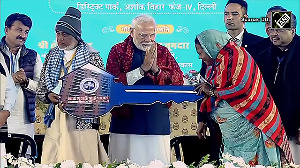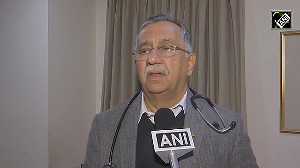The Union Budget gives the first clear indication of how willing and able the second avatar of the United Progressive Alliance government is in delivering inclusive growth.
The signal is that it is willing, but it is a bit open if it will be able to.
 The willingness, putting your money where your mouth is, comes through in actions such as sharply hiking the allocation for the flagship employment guarantee programme, the rural health mission, rural roads and the urban renewal mission. Plus there is the promise to soon bring before Parliament a bill to guarantee food security.
The willingness, putting your money where your mouth is, comes through in actions such as sharply hiking the allocation for the flagship employment guarantee programme, the rural health mission, rural roads and the urban renewal mission. Plus there is the promise to soon bring before Parliament a bill to guarantee food security.
The government also seems to be serious about addressing the deficit in the infrastructure -- both physical and social. The budgetary assistance for the railway plan, as also for rural roads, has been raised substantially.
There is a sharp hike in the allocation for higher education to respond to the fear that India is losing its edge in higher skills. If money could buy you inclusive growth then all this would go a long way.
But sustainable growth is another issue and the massive rise in the projected fiscal deficit, negating much of the fiscal consolidation achieved over the last few years of rapid growth, requires a whole lot of questions to be answered.
True, the global economy is passing though a once-in-a-century crisis and the Indian economy, having become substantially integrated with the former, must do its bit to stimulate demand and recovery.
Inflation is not threatening to return immediately but food prices and consumer price indices are running high. The foremost task to make growth sustainable, particularly when food is being promised to a third of the population at a highly subsidised rate, is to improve India's poor food crop yields and set right their flawed distribution and marketing.
In fact, improving food crop yields, particularly in dryland areas, and fighting poverty will go hand in hand.
The second issue is what the large fiscal deficit and concomitant borrowing programme will do to interest rates. The improvement in corporate performance over the last few years and Indian firms' ability to lower costs to survive global competition during a period of falling tariffs were significantly aided by falling interest rates.
Even as the central bank has created sufficient liquidity to meet the slowdown, it has found it difficult to nudge down commercial interest rates. Once that happens demand for funds will also go up, paving the way for recovery.
Matters are not helped if stepped-up government borrowing keeps bond yields high and banks can also profitably park funds with the central bank. So the short-term goal is for the government and the monetary authorities to ensure that interest rates go down, if necessary by substantially monetising the government deficit and lowering the borrowing requirement.
To make growth sustainable and inclusive (garner enough resources to transfer them to the poor) it is necessary to improve the competitiveness of the Indian economy (a must when it is substantially integrated with the rest of the world) which hinges on carrying the reform process forward. That is what will reduce transaction costs and raise productivity.
The Budget scores by firmly asserting that the date with the introduction of the goods and services tax will be kept. The abolition of the fringe benefit tax will reduce costs and the signal towards moving to a median excise duty rate of 8 per cent will help. But that is where it stops.
The Budget is lacking in two critical areas. It has not brought down external tariffs (they remain high by any comparison) when that is what nudges the economy towards greater cost competitiveness to take on cheaper imports.
It has also remained silent on further easing up foreign direct investment when the numbers are already unhealthily skewed in favour of portfolio investment. On a third, disinvestment, it has made a declaration of intent without indicating any kind of roadmap.
Above all, the government needs to act on a central political reality. Through what it has done (employment guarantee) and is set to do (food security) it has put the aam aadmi at the centre of its thought and action. This will deliver the necessary political dividend as it already has.
Political sections which oppose disinvestment and FDI, both within and outside the Congress, are really working for the public sector unions and domestic business interests. The Congress leadership can safely ignore these interests without any risk of political setback.










 © 2025 Rediff.com -
© 2025 Rediff.com -